History | 16.11.2009
Long live the republic – November 9, 1918
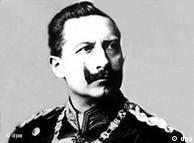 Bildunterschrift: Großansicht des Bildes mit der Bildunterschrift: German Emperor William II
Bildunterschrift: Großansicht des Bildes mit der Bildunterschrift: German Emperor William II
It was an exciting day. In Berlin and in other cities, people started to gather, as they had heard about the abdication of Emperor William II (1859 – 1941). Imperial Chancellor Prince Max of Baden (1867 – 1929) announced the abdication against William's will – he had never even been asked. But a short time later, William agreed, thus ending the imperial age in Germany. As a reaction to this development, it was said that the Communists would proclaim a Republic.
Double declaration
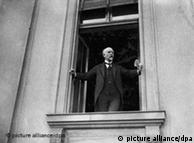 Bildunterschrift: Großansicht des Bildes mit der Bildunterschrift: Scheidemann declares a republic
Bildunterschrift: Großansicht des Bildes mit der Bildunterschrift: Scheidemann declares a republic
But Social Democrat Reichstag delegate Philipp Scheidemann beat the Communist Party of Germany (KPD) to the punch. At midday on November 9, 1918, he proclaimed Germany a republic from the balcony of the Reichstag in Berlin, even though he'd not been authorized to do so, and not all SPD officials were on his side. "The people have triumphed," he said to the throng of cheering people below. But from its first day on, the newly proclaimed republic had a heavy burden to bear. At 4 pm, an equally large crowd had gathered at the Imperial Palace in Berlin. There, Karl Liebknecht also proclaimed a republic. His speech culminated in the proclamation of a "free socialist Republic of Germany" which would bring an end to the Hohenzollern dynasty. Instead of the hated Imperial standard, the "red flag of the free Republic of Germany" should fly from now on.
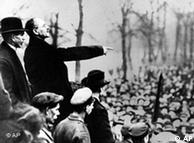 Bildunterschrift: Großansicht des Bildes mit der Bildunterschrift: Karl Liebknecht speaks to the people
Bildunterschrift: Großansicht des Bildes mit der Bildunterschrift: Karl Liebknecht speaks to the people
The young republic was trapped in a dilemma, as the people were divided. For some, the Russian Revolution in November 1917 was an enlightening model of a socialist society based on equality. For others, it was a portentous omen of a coming downfall. Between these two positions there was no common ground. Both left- and right-wing parties supported armed gangs which fought openly in the streets. The attempt to introduce a new era after the ravages of World War I was a total failure. Soldiers returning from the front were confronted with sheer chaos in which it was impossible for them to find their bearings. Many of them joined the right-wing Freikorps movement.
Christmas Crisis 1918
By the year's end, the unrest had reached such heights that the imperial chancellor had to act. Friedrich Ebert (1871 – 1925) decreed that the "Bloody Christmas" as it came to be known, should be suppressed with military means. On December 29, 1918, the transitional government collapsed, and the situation escalated. Ebert appointed Gustav Noske (1868 – 1946) to oversee the security of the government. As defense minister, he was responsible for the military. However, his tough approach to the unrest failed to bring peace; rather, the opposite was the case. At the beginning of 1919, the fighting had spread even further.
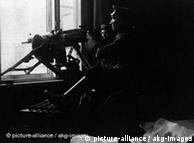 Bildunterschrift: Großansicht des Bildes mit der Bildunterschrift: The Spartacist uprising saw riots consume Berlin
Bildunterschrift: Großansicht des Bildes mit der Bildunterschrift: The Spartacist uprising saw riots consume Berlin
The Spartacist uprising resulted in conditions akin to a civil war. The uprising began after the discharge of the Berlin Chief of Police Emil Eichhorn (1863 – 1925). Eichhorn was a member of the communist KPD, which had merged with Liebknecht's Spartacus League at the end of 1918. Eichhorn's refusal to resign from his post sparked the uprising, causing riots in Berlin from January 8 – 10, 1919.
The imperial army was strengthened by the addition of the right-wing paramilitary Freikorps, which carried out a campaign against members of the Communist Party. After the defeat of the Spartacist uprising, the Freikorps went on a spree to "cleanse" the city of communists. As a result of this illegal mission, two of the KPD's icons, Rosa Luxemburg (1871 – 1919) and Karl Liebknect were murdered on January 15 and thrown into Berlin's Landwehr Canal.
Weimar Republic
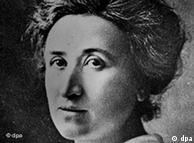 Bildunterschrift: Großansicht des Bildes mit der Bildunterschrift: German socialist Rosa Luxemburg
Bildunterschrift: Großansicht des Bildes mit der Bildunterschrift: German socialist Rosa Luxemburg
Because of the unrest, the government decided to move its seat to neighboring Weimar. In addition, the choice of this city has also meant to send a signal for the new democratic republic. Friedrich Schiller (1759 – 1805), Johann Wolfgang von Goethe (1749 – 1832) and Johann Gottfried von Herder (1744 – 1803) had all lived and worked in Weimar. The new republic should have nothing more in common with the old imperial state.
On January 19, 1919, the Weimar National Assembly met. Its task was to work out the details of a new democratic constitution. After six months of intense debate, the new constitution was ratified on July 31, and went into effect shortly thereafter. Germany was now a parliamentary democracy. But the constitution had several weak points. In particular, the powers given to the president, who could pass emergency decrees and govern without the consent of parliament, would prove to be the greatest danger.
Author: Matthias von Hellfeld (dc)
Editor: Andreas Illmer
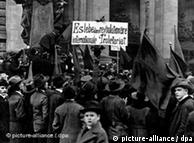
Comments